

An Introduction to Buddhism. An Introduction to Buddhism To do no evil; To cultivate good; To purify one's mind: This is the teaching of the Buddhas.
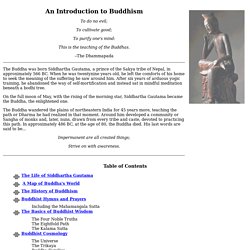
--The Dhammapada. Buddhism Demystified. Atheist Buddhists. Secular Buddhism. Secular Buddhism—sometimes also referred to as agnostic Buddhism, Buddhist agnosticism, ignostic Buddhism, atheistic Buddhism, Buddhist atheism, or Buddhist secularism—is a broad term for an emerging form of Buddhism and secular spirituality that is based on humanist, skeptical, and/or agnostic values, as well as pragmatism and (often) naturalism, rather than religious (or more specifically supernatural or paranormal) beliefs.
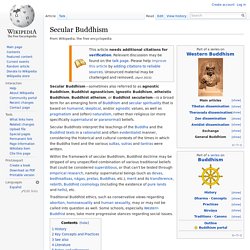
Secular Buddhists interpret the teachings of the Buddha and the Buddhist texts in a rationalist and often evidentialist manner, considering the historical and cultural contexts of the times in which the Buddha lived and the various suttas, sutras and tantras were written. Traditional Buddhist ethics, such as conservative views regarding abortion, homosexuality and human sexuality, may or may not be called into question as well. Some schools, especially Western Buddhist ones, take more progressive stances regarding social issues. History[edit] See also[edit]
The religion of Buddhism. Religions of the world Menu Quotation by Siddhãrtha Gautama (Buddha): "Do not believe in anything simply because you have heard it.
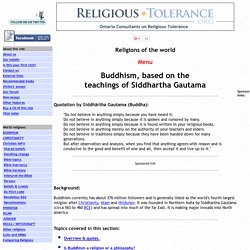
Do not believe in anything simply because it is spoken and rumored by many. Do not believe in anything simply because it is found written in your religious books. Sponsored link. What is Theravada Buddhism? Theravada (pronounced — more or less — "terra-VAH-dah"), the "Doctrine of the Elders," is the school of Buddhism that draws its scriptural inspiration from the Tipitaka, or Pali canon, which scholars generally agree contains the earliest surviving record of the Buddha's teachings.[1] For many centuries, Theravada has been the predominant religion of continental Southeast Asia (Thailand, Myanmar/Burma, Cambodia, and Laos) and Sri Lanka.
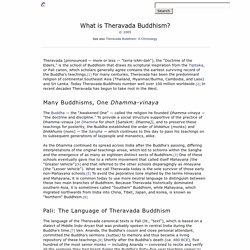
Today Theravada Buddhists number well over 100 million worldwide.[2] In recent decades Theravada has begun to take root in the West. Many Buddhisms, One Dhamma-vinaya The Buddha — the "Awakened One" — called the religion he founded Dhamma-vinaya — "the doctrine and discipline. " Theravada. Theravāda (Sanskrit: स्थविरवाद) is a branch of Buddhism that uses the teaching of the Pāli Canon, a collection of the oldest recorded Buddhist texts, as its doctrinal core, but also includes a rich diversity of traditions and practices that have developed over its long history of interactions with various cultures and communities.
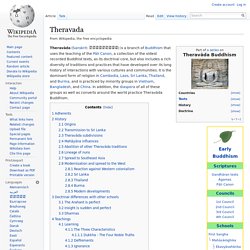
It is the dominant form of religion in Cambodia, Laos, Sri Lanka, Thailand, and Burma, and is practiced by minority groups in Vietnam, Bangladesh, and China. In addition, the diaspora of all of these groups as well as converts around the world practice Theravāda Buddhism. Adherents[edit] Buddhism must adapt to technological advances. Buddhism Basic Beliefs and Teachings. By Barbara O'Brien Updated December 29, 2015.
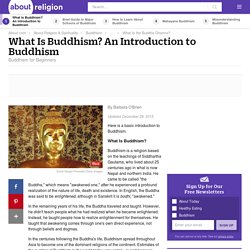
Here is a basic introduction to Buddhism. Religions - Buddhism: The Four Noble Truths. The Noble Eightfold Path: The Way to the End of Suffering. The essence of the Buddha's teaching can be summed up in two principles: the Four Noble Truths and the Noble Eightfold Path.
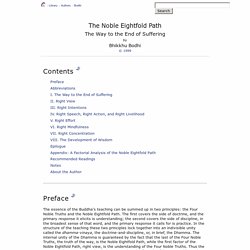
Six right livelihood guidelines. Thai Forest Tradition. The Thai Forest Tradition is a tradition of Buddhist monasticism within Thai Theravada Buddhism.
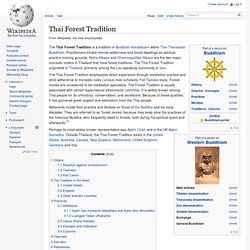
Practitioners inhabit remote wilderness and forest dwellings as spiritual practice training grounds. Maha Nikaya and Dhammayuttika Nikaya are the two major monastic orders in Thailand that have forest traditions. The Thai Forest Tradition originated in Thailand, primarily among the Lao-speaking community in Isan. The Thai Forest Tradition emphasizes direct experience through meditation practice and strict adherence to monastic rules (vinaya) over scholastic Pali Tipitaka study. Forest monks are considered to be meditation specialists. Adherents model their practice and lifestyle on those of the Buddha and his early disciples. Perhaps its most widely known representative was Ajahn Chah and in the UK Ajahn Sumedho. Origins[edit] [edit] In Thailand, Buddhism plays a central role in society. Teachers[edit] Pali Canon[edit] In the Andhakavinda Sutta:[7] BuddhaNet. 25 Life Changing Lessons to Learn from Buddha. “If we could see the miracle of a single flower clearly, our whole life would change.” ~ Buddha There are so many beautiful, powerful and life changing lessons I have learned from studying Buddhism and from reading many of Buddha’s quotes.
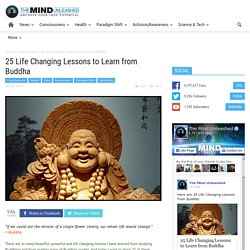
And today I want to share 25 of these beautiful lessons with you. Here are 25 Life Changing Lessons from Buddha: 1. Love heals all things. “Hatred does not cease by hatred, but only by love; this is the eternal rule.” 2. “A man is not called wise because he talks and talks again; but if he is peaceful, loving and fearless then he is in truth called wise.” “A dog is not considered a good dog because he is a good barker. 3. Zen Master Thich Nhat Hanh. Thich Nhat Hanh (pronounced Tick-Naught-Han), is a Vietnamese Buddhist monk, author, teacher and peace activist.
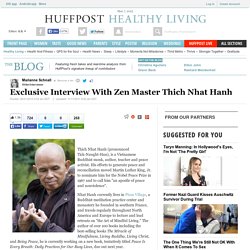
His efforts to generate peace and reconciliation moved Martin Luther King, Jr. to nominate him for the Nobel Peace Prize in 1967 and to call him "an apostle of peace and nonviolence". Nhat Hanh currently lives in Plum Village, a Buddhist meditation practice center and monastery he founded in southern France, and travels regularly throughout North America and Europe to lecture and lead retreats on "the Art of Mindful Living. " The author of over 100 books including the best-selling books The Miracle of Mindfulness, Living Buddha, Living Christ, and Being Peace, he is currently working on a new book, tentatively titled Peace Is Every Breath: Daily Practices for Our Busy Lives, due out next year.
Marianne Schnall: What effects do you see on your own daily life regarding your relaxation and meditation practices? We humans have lost the wisdom of genuinely resting and relaxing. Spiritual Inquiry . com » 160 Zen stories. Dalai Lama tells his Facebook friends that religion "is no longer adequate" Well, he'd hardly be the first Buddhist to say something like this. From what I've read, there are already lots of Buddhists, and historical Buddhist movements in various countries, who are atheistic and who prefer to return to Buddhism's roots as a kind of self-help, personal psychological and philosophical system—and yes, I realize I'm hugely oversimplifying that ideological stripe of Buddhism—and that's fine. And if this helps the world be a better place, cool. I'm all for it. But as an atheist I had already got to this point without making sand paintings, spinning prayer wheels or staring at stupas or rock gardens to shut off all mental processes and get to Satori.
Maybe I'm just doing it wrong. The Dalai Lama’s 18 Rules For Living. May 6, 2011 | 42 Comments » | Topics: Life, List At the start of the new millennium the Dalai Lama apparently issued eighteen rules for living. Since word travels slowly in the digital age these have only just reached me. Here they are. Take into account that great love and great achievements involve great risk. When you lose, don’t lose the lesson. Via OwenKelly.